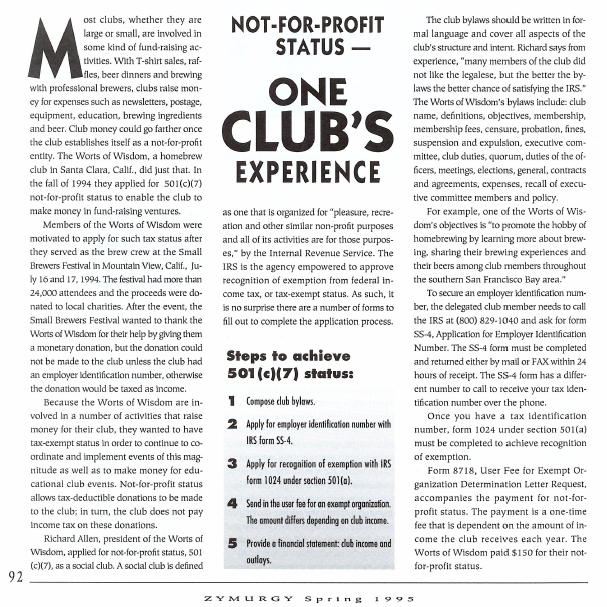
By Caroline Dunker, Worts of Wisdom member
In Zymurgy Spring 1995 (Vol. 18, No. 1) “Club News”, we learned about the experience of incorporating their club from the Paumanok United Brewers, Inc. (PUB). In that same issue, the Worts of Wisdom also shared their experience.
Most clubs, whether they are large or small, are involved in some kind of fund-raising activities. With T-shirt sales, raffles, beer dinners and brewing with professional brewers, clubs raise money for expenses such as newsletters, postage, equipment, education, brewing ingredients and beer. Club money could go farther once the club establishes itself as a not-for-profit entity. The Worts of Wisdom, a homebrew club in Santa Clara, Calif., did just that when they applied for 501(c)(7) not-for-profit status to enable the club to make money in fund-raising ventures.
Members of the Worts of Wisdom were motivated to apply for such tax status after they served as the brew crew at the Small Brewers Festival in Mountain View, Calif., July 16 and 17, 1994. The festival had more than 24,000 attendees and the proceeds were donated to local charities. After the event, the Small Brewers Festival wanted to thank the Worts of Wisdom for their help by giving them a monetary donation, but the donation could not be made to the club unless the club had an employer identification number, otherwise the donation would be taxed as income.
Because the Worts of Wisdom are involved in a number of activities that raise money for their club, they wanted to have tax-exempt status in order to continue to coordinate and implement events of this magnitude as well as to make money for educational club events. Not-for-profit status allows tax-deductible donations to be made to the club; in turn, the club does not pay income tax on these donations.
Note: 501(c)(7) Social Clubs must make a minimum of 65% of their annual revenue from member dues, thus revenue from sources other than member dues cannot make up more than 35% of the club’s annual revenue.
Richard Allen, president of the Worts of Wisdom, applied for not-for-profit status, 501(c)(7), as a social club. A social club is defined as one that is organized for “pleasure, recreation and other similar non-profit purposes and all of its activities are for those purposes,” by the Internal Revenue Service. The IRS is the agency empowered to approve recognition of exemption from federal income tax, or tax-exempt status. As such, it is no surprise there are a number of forms to fill out to complete the application process.
The club bylaws should be written in formal language and cover all aspects of the club’s structure and intent. Richard says from experience, “many members of the club did not like the legalese, but the better the bylaws the better chance of satisfying the IRS.” The Worts of Wisdom’s bylaws include: club name, definitions, objectives, membership, membership fees, censure, probation, fines, suspension and expulsion, executive committee, club duties, quorum, duties of the officers, meetings, elections, general, contracts and agreements, expenses, recall of executive committee members and policy.
For example, one of the Worts of Wisdom’s objectives is “to promote the hobby of homebrewing by learning more about brewing, sharing their brewing experiences and their beers among club members throughout the southern San Francisco Bay area.” To secure an employer identification number, the delegated club member needs to call the IRS at (800) 829-1040 and ask for form SS-4, Application for Employer Identification Number. When completed the SS-4 form has a different number to call to receive your tax identification number over the phone. Once you have a tax identification number, form 1024 under section 501(a) must be completed to achieve recognition of exemption. Form 8718, User Fee for Exempt Organization Determination Letter Request, accompanies the payment for not-for-profit status. The payment is a one-time fee that is dependent on the amount of income the club receives each year. The Worts of Wisdom paid $150 for their not-for-profit status.
The club’s financial statement is included with form 1024. The club sends in an annual statement to the IRS once they have achieved not-for-profit status. Having a good treasurer is helpful on this one! If a club is just starting out, this will be the easiest part of the application process.
Richard’s previous experience writing bylaws as a member of a dart league gave the Worts of Wisdom a head start in this regard, which helped the process of achieving not-for-profit status. The club bylaws were passed by the club, and the IRS forms were submitted shortly thereafter. The club was a legal entity by the end of that year.
The club bylaws can be modified after a club receives 501(c)(7) status. As long as the club’s basic purpose remains unchanged and it is not producing or distributing a product for profit, the club can retain not-for-profit status.
Richard recommends that clubs get as much done ahead of time as they can. “It helps if you assume the IRS will tell you that you did something wrong, so be thorough,” Richard says. In Richard’s view, becoming a not-for-profit entity is a club-motivated task. The IRS does not wish to police clubs, they are happy clubs are reporting their income. Richard says, “We are simply telling the IRS what our club is doing financially which, in turn, allows us to make money for the club.”
Not-for-profit status is different from non-profit or incorporated status. Check out the details on how to incorporate your club and the benefits for doing so.
Steps to achieve 501(c)(7) status:
- Compose club bylaws
- Apply for employer identification number with IRS form SS-4
- Apply for recognition of exemption with IRS form 1024 under 501(a)
- Send in the IRS form 8718 user fee for an exempt organization; the amount depending on club income
- Provide a financial statement: club income and outlays






Share Post